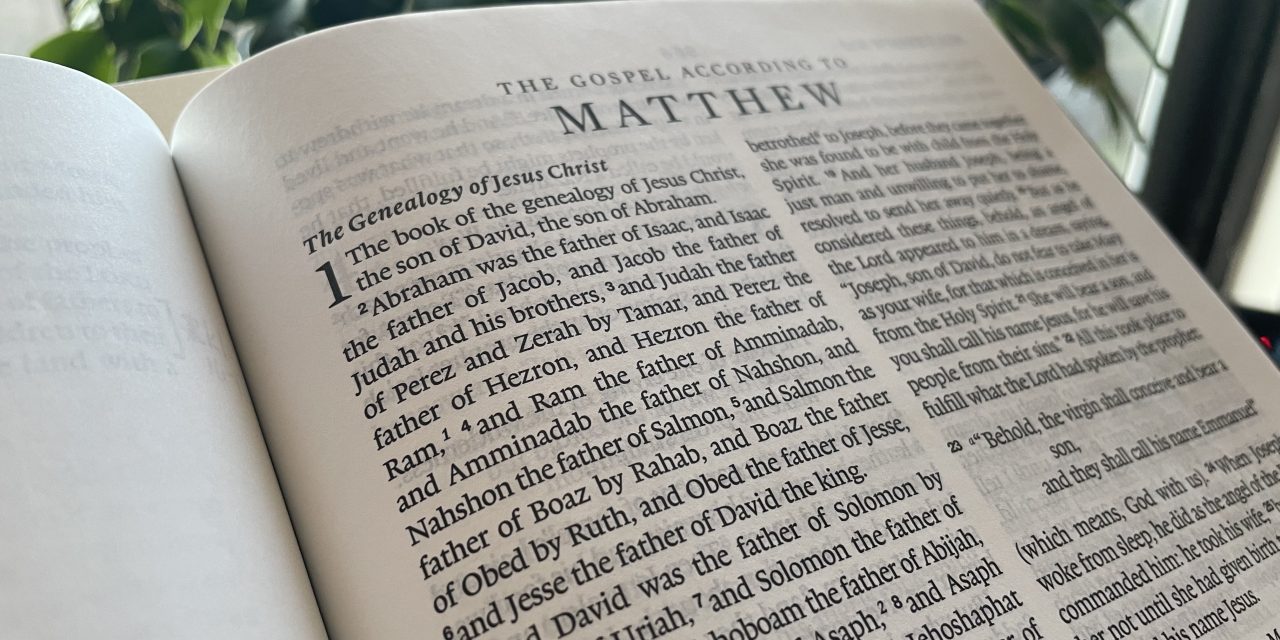Whether I’m leading a parish mission or a staff retreat, teaching a Bible study, or talking one-on-one with someone who has questions about the spiritual life, I always encourage the daily reading of Sacred Scripture.
This can be incorporated into your life in many different ways, which I’ll detail below. But it’s vital to your spiritual life to have your eyes, mind, and heart on the Scriptures every single day. The Sacred Scriptures are the way that God speaks to you:
“For in the sacred books, the Father who is in heaven meets His children with great love and speaks with them; and the force and power in the word of God is so great that it stands as the support and energy of the Church, the strength of faith for her sons, the food of the soul, the pure and everlasting source of spiritual life.” (Dei Verbum 21)
As Catholics, we hear the Scriptures at every Mass we attend. Our liturgical life is imbued with the words and prayers of the Scriptures, more than we might even realize. But we also need to be reading the Word of God personally. Here are four ways you can incorporate the daily reading of Sacred Scripture into your life:
Daily Mass Readings
Even if you are blessed to be able to attend Mass more often than on Sunday, I encourage you to make the daily Mass readings part of your private daily prayer. While it’s wonderful to read other parts of Scripture, perhaps making your way through the entire Bible, the daily Mass readings are being proclaimed and heard by your fellow Catholics throughout the world. Unite your prayer with them as you meditate on the same Scriptures.
Tip: The Amen app from the Augustine Institute is a free Catholic prayer app that includes the audio of many different Catholic prayers and meditations, including the daily Mass readings. Listen on your commute in your car. Listen while sitting in the peacefulness of the area you’ve designated in your home for prayer. Listen with your earphones in, blocking the not-so-peacefulness of your home. The Amen app allows you to listen to the Scriptures no matter how busy your life gets.
Liturgy of the Hours
The Liturgy of the Hours, or Divine Office, is the communal prayer of the Church prayed to mark the hours of the day. It consists of set Psalms, other readings from Scripture, and prayers that rotate on a four-week basis. It is prayed by priests and religious throughout the world. When you pray it, like the daily Mass readings, you are praying in union with the universal Church. When you incorporate even part of the Divine Office into your daily routine, the words of Scripture become second-nature to your life. You’ll find certain phrases from the Psalms popping into your mind throughout the day. Isn’t this what we should all desire in our relationship with the Word?
Tip: Do not try to pray every single part of the Divine Office, unless you are a priest, religious, or consecrated lay person. Instead, incorporate the hours in a way that fits your life as an active Catholic in the world. Perhaps you pray Vespers, or Evening Prayer, on Sundays to celebrate the Lord’s Day. If you want to try to pray the Office more frequently, I encourage beginning with Compline, or Night Prayer. Since it does not follow the same four-week rotation as the other hours and it is among the shortest of the hours (not including some of the midday prayers), it is far more manageable. Remember, prayer practices that are smaller and more manageable are more likely to become habits.
Pick a Book
Another approach to reading Scripture daily is to choose a book of the Scriptures and begin reading a small part of it everyday. Perhaps you begin with the Psalms, and read a Psalm every night before you go to bed. Or you choose one of the Pauline Epistles and read five verses every day on your lunch break. This will bring you to incorporate Scripture throughout your day, either into prayer time you’ve already set aside or to make new habits.
Tip: It’s not a race. You do not need to finish the Psalms in a hundred and fifty days, the Letter to Timothy in a week, or the entire Bible in a year. It doesn’t matter how much you finish. There’s no test at the end. Rather, what matters is that you’re listening to the Word of God and praying with it. If you’re not meditating on the Word and allowing that Word to change your life, it doesn’t matter how many verses you’ve read. In my online community dedicated to Scripture study, I’m challenging everyone this month to read a single verse of one chapter of John each day. Just one verse a day! You know why? Because I want people to realize it’s not the quantity that matters. It’s the daily, intentional reading that leads to prayer that matters.
Lectio Divina
I have written about Lectio Divina here before, so if this is a new phrase, I’d invite you to head over here to find out more. Pope Benedict said that lectio divina “will bring to the Church – I am convinced of it – a new spiritual springtime.” We need a Church immersed in the Word of God. That means not just reading it, but praying it and living it.
Tip: Many of us find the practice of lectio divina daunting. Am I doing it right? What if I forget the steps? What if I don’t know what to ask, or think, or say? My first advice would be to just continue to do it. Don’t worry about doing it incorrectly. Pick up the Scriptures and just start reading, asking questions, and sitting with the words. If you want some help, I occasionally go live on YouTube to pray lectio divina. You can find them at my YouTube channel here.
Our Lord is waiting for you in His Word.
Ensure that each day you study some Scripture passage…. After prayer, reading should follow, and after reading, prayer…. Instead of jewels and silk clothing, may you love the divine Books.
St. Jerome














